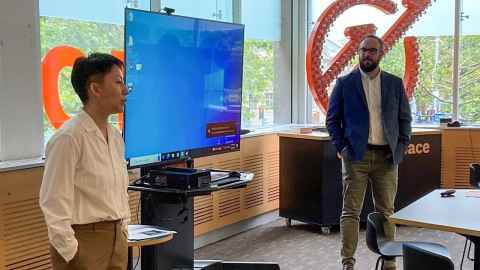How Future17 opened the door to an exciting new future
02 May 2025
When international exchange student Sophie Robertson enrolled in Future17, it boosted her confidence, unlocked a new skillset and supercharged her career prospects.

International exchange student Sophie Robertson hails from Glasgow in Scotland. She saw an email about the Future17 programme and thought it looked like a great opportunity – even though it was outside the scope of her degree in geography and computer science.
I am quite commercially minded but I’ve never formally done anything that ties
into business or marketing.
Immersed in a world of coding, map making and mathematical modelling, Robertson had never set foot in a business class before enrolling in Future17. “You get to choose your preferences for what sort of projects you’d like to be on when you begin, and I’m very interested in science education and systems,” says Robertson, who was put in a team that was asked to deliver a marketing campaign for Foodstuffs New Zealand. “I was really surprised, but whoever allocated me to the project must have read my application and decided I had the soft skills needed to be able to communicate ideas.”
Participants in Future17 are put into teams with students from around the globe and asked to solve real-world Sustainable Development Goal challenges for real clients. Their client, Foodstuffs New Zealand, was installing energy-efficient refrigeration units in all their stores to reduce their carbon footprint and needed a comprehensive marketing package to sell-in the change. Instead of open refrigerators, customers would be faced with refrigerator doors, and these same customers needed to be educated about sustainability and why keeping the doors shut mattered. “That’s quite a difficult thing for people to get excited about,” says Robertson, yet this simple change would have a tangible impact on lowering the supermarket’s carbon footprint.
Future17 was a steep and prolonged learning curve for Robertson. In her team were six other students – two from South Africa, two from Hong Kong, and one each from Kazakhstan and New Zealand – and they went through all the usual challenges of trying to work across time zones and cultures to deliver a complex project on a tight deadline.
With help from her mentors, including Andrew Patterson from the Business School, who leads Future17, Robertson found her leadership style and learned not to shy away from difficult conversations, which were sometimes necessary to keep the project on track. “I learned that I don’t need to be afraid of setbacks, I just need to make sure that we’re always going to move in the direction of progress, even if there are a few things in the way.”

Foodstuffs New Zealand were delighted with the team’s work, and Robertson attributes her success on the programme to an attitude of curiosity. “Even though at the start, I thought maybe I didn’t have the skills, I never doubted for a second that I would be able to pick it up. Just going into anything with an open mind, even if you potentially don’t have the skills right off the bat, is always going to be the right course of action – and for me it paid off really well.”
After completing Future17, Robertson felt confident and comfortable applying for internships in the business and financial sectors. In interviews, prospective employers were blown away by the fact that she had led an international team of seven on a real project with a real client on a real deadline, and she believes it gave her a powerful edge.
I’m starting an internship in London in financial services that I would never have thought that someone with a geography degree could do, but now I know that you can do whatever you want.
For now, that’s joining EY as an Assurance Intern later this year, giving clients in the finance industry assurance for how well their company is performing environmentally, but Robertson feels like she could go anywhere from here. “I feel liked I’d be comfortable, in my future internships, being put on projects that I don’t necessarily have the skills for, knowing that there are people to help me, and everyone does make mistakes, and I can learn things. It was a massive confidence builder for me doing something academically that was so outside my comfort zone, and what I’d done previously.”
She would absolutely encourage other students to give Future17 a go. “It is going to be hard, and it is going to be challenging, and that's why it's called the Sustainable Development Goals challenge. But the joy of that is you will get so much more out of it. It will really stretch and grow the muscles of creativity, the muscles of teamwork.”